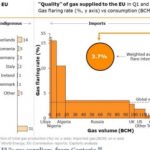Is bioenergy green? It depends, says Jessica Allen at the University of Newcastle. She lays out five key questions that should be asked about every bioenergy project. What is its source? Native forest residues, dedicated fast-growing biomass species, agricultural residues and “waste” biomass: all have pros and cons that must first be carefully measured. How many emissions are embodied in the collection and transport of the biomass to the plant? … [Read more...]
EU Elections 2024: the Green Deal is being sidelined. What can be done?
In the run-up to the EU elections this June, Andrea Renda at CEPS, writing for IDDRI, says the Green Deal is being ousted from the public debate. Protests against important elements of the Green Deal – including environmental regulations, wind and solar farm installations, a ban on combustion engines – are being used by populists to scare mainstream politicians away from openly championing Europe’s green and clean energy ambitions. Proponents of … [Read more...]
The world needs 200,000 Offshore Wind turbines by 2050: mapping the locations, constraints
Hugo Putuhena, Fraser Sturt and Susan Gourvenec at the University of Southampton summarise the results of their methodology that determines where to locate the hundreds of thousands more offshore wind turbines the world needs to meet net-zero targets. The world may need as many as 200,000 offshore turbines by 2050, generating 2,000GW. At the end of 2022, 63GW had been installed worldwide, so that means 32 times current capacity. If the “power … [Read more...]
Circular Battery Economy: what policies and processes can accelerate recycling and reuse?
As battery production scales up so do the risks of the long global supply chain failing, or causing more emissions, damaging the environment, and breaching human rights. A circular battery economy should greatly reduce those risks. Yet the U.S. has no federal recycling mandates or requirements for lithium-ion batteries, and state policies are inconsistent. Marie McNamara at RMI maps out the five critical issues that must be dealt with. Before … [Read more...]
Fulfilling U.S. wind and solar ambitions will use under 1% of its land (that’s less than the fossil fuel footprint)
Meeting the U.S.’s wind and solar ambitions in full would take up less than 1% of its land, less than the fossil fuel industry’s current footprint. Steve Clemmer at UCS goes into the details of NREL’s comprehensive study of land use for wind and solar. Of particular interest is the observation that setting a high bar for “responsible siting” of wind and solar projects - avoiding the use of sensitive, protected, urban areas, difficult terrain or … [Read more...]
Doubling clean energy investments from “natural” redirection of existing spend on infrastructure, buildings, fossils +more
Annual investments in clean energy stand at $1.4tn, now greater than investments in fossil fuels ($1tn). But that needs to double by 2030. This steep climb will be made easier by the natural cycle of global investment, as well as the cost-benefits of abandoning fossil fuels for renewables and greater efficiencies, says Stephen Peake at The Open University. Each year, around a quarter of our GDP is anyway spent on new machinery, buildings and … [Read more...]
Pollution costs are driving U.S. states to look for alternatives to Gas-Fired Plants
In the U.S. a growing number of states and regulators are directing utilities to look for alternatives to proposed gas-fired power plants, citing environmental justice and community health impacts, explain Caitlin Odom and Lauren Shwisberg at RMI. So it’s not just about emissions: pollution matters too. The authors quote studies that show clean energy portfolios (CEPs) not only reduce energy costs, but can save billions of dollars in community … [Read more...]
Wind and Solar expansion is a threat to biodiversity. But by how much?
Wind and solar take up space, so a massive expansion will have an effect on biodiversity. But how much? Sebastian Dunnett at Hammersmith and Fulham Council in London, writing for Carbon Brief, summarises his co-authored paper that takes the latest data on wind and solar and its multiple impacts (a few are good, surprisingly) on the environment. The conclusion is that the consequences of land overlap need not be as severe as feared, provided … [Read more...]
EU Taxonomy: why nations are backing Nuclear and Gas
The heated debates over the potential inclusion of nuclear power and natural gas in the EU taxonomy has again exposed the different interests of EU nations. Simon Göss at cr.hub, writing for Energy Brainpool, explains what parameters the EU taxonomy controls, what conditions are attached should the two technologies be classified as sustainable, as well as summarising those national interests and constraints. Critics say neither should be … [Read more...]
Gas Crunch: time to factor in volatility and externalities to reveal its true costs
The current gas price shock (and any future ones) raises the question: if we had invested more in renewables, efficiency, buildings renovation, and green gases, would we be actually saving money instead of losing it? Looking at the EU, Dolf Gielen, Michael Taylor and Barbara Jinks at IRENA urge governments to do something they’ve not done before and factor in the negative impacts of volatile fossil fuel prices. Moreover, they should calculate the … [Read more...]
The IEA explains its new “Net-Zero Emissions by 2050” roadmap
Today the IEA publishes its new special report, “Net Zero by 2050: a Roadmap for the Global Energy Sector”, its deepest dive so far into what’s needed for a successful global transition. It analyses the options as well as the socio-economic, behavioural and environmental impacts they will have globally. Here, Laura Cozzi (Chief Energy Modeller) and Timur Gül (Head of the Energy Technology Policy Division) at the IEA summarise the key principles … [Read more...]
Netherlands: gas phase-out transition must tackle the geopolitical implications of importing from Russia
Until recently, the Netherlands has had no major concerns regarding natural gas security of supply. That’s just as well, given gas plays a big role primarily in the generation of heat: 90% of buildings and 40-50% of industrial heat are based on gas. Now, decarbonisation plans to cut its own gas production as well as consumption brings with it major dilemmas. Irina Patrahau and Lucia van Geuns at The Hague Centre for Strategic Studies present a … [Read more...]
Kenya, Bangladesh: Environmental rulings stall coal plans. So should the economics
The construction of two coal-fired power plants has been stalled in Kenya by the Kenyan courts and in Bangladesh by UNESCO, both for environmental reasons. It’s an opportunity for the two countries to also recognise the purely commercial reasons to go for renewables, says Simon Nicholas of IEEFA. While most of Asia has been powering ahead with renewables, Bangladesh has been lagging behind. But a continued rollout of renewable energy will quickly … [Read more...]
GDP – Gross Environmental Damage = actual wealth creation
We all know that GDP measures everything that’s been paid for, both the good and the bad. There have already been studies that try to account for the “bad” GDP that costs us in the long run and so adds less value than stated. Catherine Wolfram, at the Haas School of Business, takes a thoughtful look at Gross Environmental Damage which separates out the kind of GDP that we’re going to have to spend money cleaning up in the future. The GED concept … [Read more...]
Renpower Ukraine 2019
The 2nd Renewable Energy & Power Infrastructure Investors Conference Register now Program Euroconvention Global is excited to announce the forthcoming RENPOWER Ukraine 2019: The 2nd Renewable Energy & Power Investment Conference set to take place on January 31st at the Intercontinental Hotel in Kiev. The inaugural edition hosted 150+ participants from 28 countries and was evaluated by all attendees as a cost-effective informative … [Read more...]
















